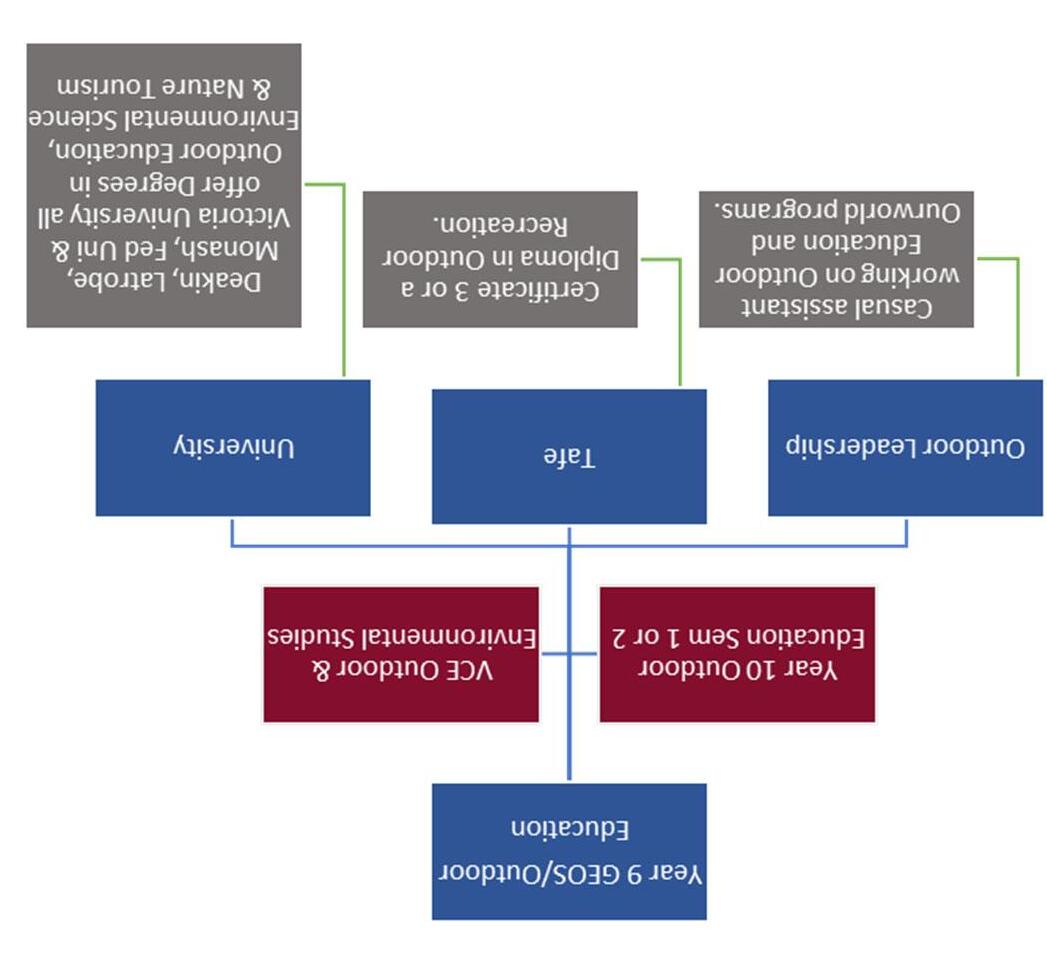Outdoor Education & Environmental Studies
Year 10 & VCE
Acceleration Criteria for year 9 students wishing to complete VCE Outdoor & Environmental Studies
Units 1 & 2 in Year 10
Minimum B average in English


Prerequisite: GEOS Prom or Outdoor Education
Endorsement from subject teacher and Year 9 Coordinators based on the student’s ability to:
Exhibit a strong preference for challenge and fast pacing of instruction
Engage in both OES curriculum and practical activities
Think and work independently
Demonstrate maturity and preparedness to take risks
Remain highly organised and punctual in completion of homework and catchup in other subjects
Why study Outdoor Education at Senior School?

Experience Victoria’s outstanding natural environments
Develop skills that will lead to life long enjoyment of the outdoors

Gain understanding of the outdoors through experience
Beyond Secondary Education
Over 150 Students elect Outdoor Education each year at the senior campus. Those students experience and learn from a range of unique Victorian locations including the alpine environment, heathlands, oceans and riparian forests.
Our programs aim to engage students in their learning and lead them onto Year 12 Outdoor and Environmental studies where students have gained Premier Awards for perfect scores and 30% of our students are in the top 5% of the state.
Outdoor Education in Senior School combines academic excellence with a variety of experience, adventure, challenge, environmental knowledge and safety.
Develop self confidence and independence by looking after yourself with minimal facilities
Opportunities for leadership and understanding group dynamics

Move towards a career in the rapidly growing outdoor and tourism industry
Learn about the practicalities of sustainability

Think, question and wonder about the world around you.
Be engaged in your learning!!!
Build resilience and emotional intelligence
Outdoor Education at Christian College equips students with lifelong problem solving, teamwork, decision making and self-management skills that are transferable to students’ future careers and pathways.
A passion in Outdoor Education can lead to careers in education, land management, conservation, nature/adventure tourism, youth at risk programs, guiding recreational activities, agricultural science, geology, landscape architecture, emergency services and many more.
Year 10 Outdoor Education
Students participate in weekly practical activities to gain a deeper understanding and appreciation of the curriculum covered in the classroom and develop their practical skill associated with each activity. Practical Experiences complement the following units of work. Semester 1 and 2 are identical, although some activities may vary depending on weather conditions.
VCE Outdoor & Environmental Studies
Unit 1 - Video Link
Overnight trip in the Otway National Park participating in mountain bike riding in Forest and Surfing in Lorne .
Unit 3
Alpine Crossing—journey from Mount Hotham to Falls creek during the summer to help understand how humans have utilised these areas through different historical periods.
Students will draw on this experience to help them analyse the changing nature of human relationships with outdoor environments.
Semester 1 or 2 Video Link
Rivers & Oceans Unit
Canoeing, paddle/hike/camp and the possibility of other activities depending on weather.
Risk Unit
Rock Climbing (optional camp) and MTB or MTB & indoor climbing and the possibility of a day trip to the snow.
Enviro Citizen Unit
Student driven project
The Grampians hike tests students preparation and resilience while its unique geological formations engage curiosity about its creation.
Unit 2
Students visit the Anglesea health, Baw Baw plateau and The You Yangs to investigate natural change and human impacts to environments while discovering different ways of managing them sustainably.
Unit 3 & 4 Video Link
Unit 4
Snow Camping Bogong High plains—Students will return to the alpine environment in the winter to camp in the snow and cross country & down hill ski.
This experience helps students investigate the importance of healthy environments and how to assess the health of them. It also offers insight into the complex management conflicts that occur when trying to sustainable manage areas with conflicting uses.
